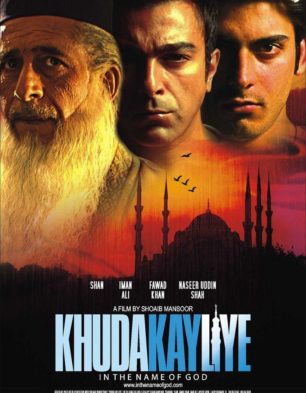Musical talents from Pakistan have been steadily making an entry in the Bollywood music scenario since the past decade. But there remains a lot of potential from the country which is still untapped. The soundtrack of the first Pakistani film Khuda Kay Liye, making its theatrical release in India, only substantiates the point. And with the film’s theme revolving around two pop musician brothers from Lahore, the film gets all the more scope for music. Unlike Bollywood albums where we encounter singers from the neighbouring country in instalments, here is an entire album with only Pakistani artists. Be prepared to come across some completely new names, though.
The last time we heard about Bulleh Shah was when Rabbi Shergill adapted his poetry in the popular fusion Bulla Ki Jaana . And now Khawar Jawad adapts another piece of writing of this Sufi Punjabi poet from Pakistan to compose an enticing number Bandya . Ably supported by the vocals of Farah Zala, the Sufi number is infused with lively guitaring and drumming to give it a rock feel. The pure Punjabi lyrics by Bulleh Shah are instilled with some English lines though not in the usual rap format.
Faiza Mujahid replaces the vocals of Farah Zala in another version of the same song without any audible difference otherwise. A remix version also follows where DJ Suketu uses his standard mixing techniques to give the song more momentum for a disco feel. Expect this number to rock the party scene once the movie releases.
Take a divine dip as Saeen Zahoor indulges in an undiluted rendition of Allah Hoo . Much in the mode of the azaan calls from mosques, Saeen maintains poise in the prolonged opening stretch with practically no instrumentation. Khawar Jawad and Rohail Hyatt’s echoing music arrangements give a trance feel to the track. Zara Madani’s female voice plays for a small part but adds to the effect.
From devotional to a dance number, the track changes identity with the remix version by DJ Aqeel. Aqeel’s mixing style though regular is something that never goes wrong.
Director Shoaib Mansoor writes Hindi-Urdu lines for the title song Khuda Kay Liye that speaks about secularism. Sajjid Akram’s tune strangely reminds of another Pakistani singer Nazia Hasan’s famous song Baat Ban Jaye from the Hindi film Qurbani (1981), though the tracks fall in divergently different genres.
Ahmad Jahanzeb sings a mellow romance number Janie Janie on low notes and his voice takes prominence over his arrangements (with Shuja Haider) of the song. Ahmad’s singing approach is sugary-sweet, something popularly pursued by female singers.
But with the following track Tiluk Kamod, Ahmad displays his splendid hold over classical notes as he sings and arranges the song in strong Indian flavour with lyrics derived from Avadhi folklore. For connoisseurs of classical music, this one is a rare gem in times of synthesized melodies.
Classical alaaps continue to be the highlight in Mahi Way composed and crooned by Khawar Jawad. Faiza Mujahid writes English lines and also lends her ‘enigma’tic voice to the song.
The last two tracks Hamaray Hay and Duniya Ho , written by Shoaib Mansoor and sung by Ahmad Jahanzeb and Shuja Haider exude positive vibes with their optimistic approach, that’s palpable both in the tune and words. These situational numbers promise more video appeal than audio.
Khuda Kay Liye starts as a Sufi album, goes devotional, turns tracks with classical shades and finally ends on a filmi note. Give it a try for some un-migrated Pakistani sound.


